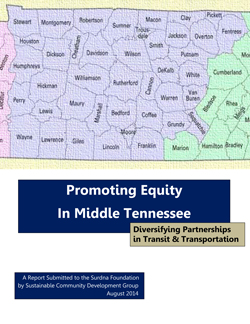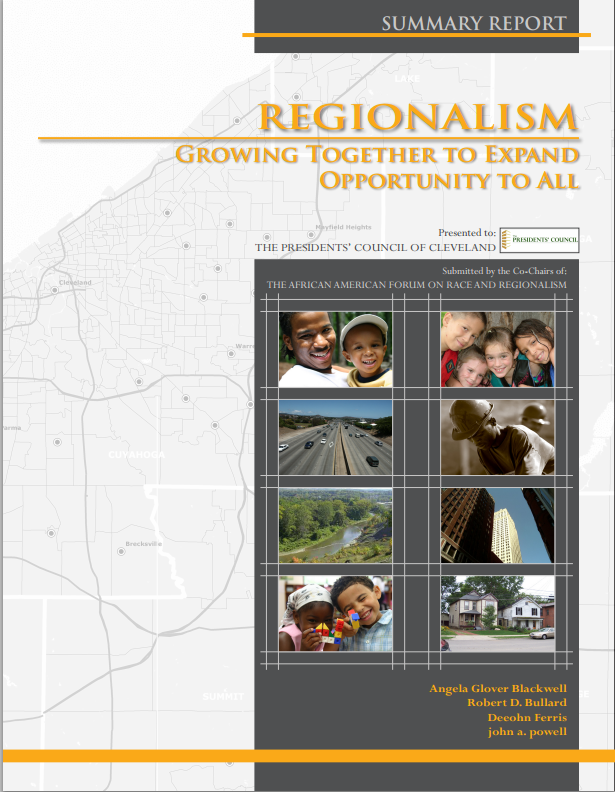Promoting Equity In Middle Tennessee: Diversifying Partnerships In Transit and Transportation
 SCDG delivered equitable development capacity building technical assistance, research and stakeholder outreach. Cumberland Region Tomorrow is a regional transportation network and statewide voice on next generation infrastructure solutions. The network’s equity goal is creating and enhancing access to opportunities for all people. Technical assistance and the report focus on improving equity measures, inclusive network leadership and advancing the equity dialogue in Tennessee. Recommendations include strategies that strengthen connections to grassroots civic infrastructure and leaders from low income communities and communities of color; collaborating to improve equity measures and inclusive leadership; and forging diverse partnerships that strengthen transportation networks, infrastructure investments, neighborhood access to transit and jobs, and public safety. Project funding was generously provided by the Surdna Foundation.
SCDG delivered equitable development capacity building technical assistance, research and stakeholder outreach. Cumberland Region Tomorrow is a regional transportation network and statewide voice on next generation infrastructure solutions. The network’s equity goal is creating and enhancing access to opportunities for all people. Technical assistance and the report focus on improving equity measures, inclusive network leadership and advancing the equity dialogue in Tennessee. Recommendations include strategies that strengthen connections to grassroots civic infrastructure and leaders from low income communities and communities of color; collaborating to improve equity measures and inclusive leadership; and forging diverse partnerships that strengthen transportation networks, infrastructure investments, neighborhood access to transit and jobs, and public safety. Project funding was generously provided by the Surdna Foundation.
US EPA Sustainable Communities & Environmental Justice Study
SCDG conducted the federal study for EPA’s Office of Environmental Justice. The report surveys public programs and funding sources that assist community leaders with incorporating sustainability into local community and economic development. Delivery included research design and analysis; identification of diverse stakeholders; evaluating community capacity building best practices and tools; and strategies that align EPA’s and federal policies, programs and grants. Stakeholder dialogues examined community capacity to engage in the land use and zoning process, municipal and transportation planning, historic preservation, environmental cleanup and job creation.
“Regionalism: Growing Together to Expand Opportunity to All” National Study
 SCDG managed the distinguished consulting team of john powell, Kirwan Institute for the Study of Race & Ethnicity at Ohio State U., Angela Glover-Blackwell, Policy Link, and Robert Bullard PhD, Clark Atlanta University Environmental Justice Resource Center. The team produced the Cleveland and Northeast Ohio study of the region and Cleveland’s African American community. The report examines historical policies and regional dynamics of urban decline, suburban sprawl and community disparities. Regionalism is explored as a potential solution to address the challenges, connect people to opportunity structures, reduce disparities in resources and competition between communities in the region, and manage the sprawling development patterns. The project was commissioned by the Cleveland region’s President’s Council, prominent African American corporate executives, elected officials and academics including Mayor Frank Jackson and US Rep. Marcia Fudge; and it was funded by the Cleveland Foundation.
SCDG managed the distinguished consulting team of john powell, Kirwan Institute for the Study of Race & Ethnicity at Ohio State U., Angela Glover-Blackwell, Policy Link, and Robert Bullard PhD, Clark Atlanta University Environmental Justice Resource Center. The team produced the Cleveland and Northeast Ohio study of the region and Cleveland’s African American community. The report examines historical policies and regional dynamics of urban decline, suburban sprawl and community disparities. Regionalism is explored as a potential solution to address the challenges, connect people to opportunity structures, reduce disparities in resources and competition between communities in the region, and manage the sprawling development patterns. The project was commissioned by the Cleveland region’s President’s Council, prominent African American corporate executives, elected officials and academics including Mayor Frank Jackson and US Rep. Marcia Fudge; and it was funded by the Cleveland Foundation.
University of Maryland Democracy Collaborative Report
SCDG conducted surveys and research informing the Democracy Collaborative project: “Linking Anchor Institutions to Outcomes for Low-Income Families, Children and Communities,” a study for the Annie E. Casey Foundation. Anchor institutions, universities, hospitals and other entities, are rooted in local communities by mission, invested capital, or relationships to customers, employees, and vendors. As place- based entities controlling immense economic, human, intellectual, and institutional resources, potentially they generate crucial local benefits to communities. Applying an equity lens, the study facilitates development of metrics that measure beneficial impacts and increase community accountability. Equitable community economic development recommendations incorporate identifying opportunities for collaboration with locally based community organizations; evaluating partnership challenges; and addressing barriers. SCDG identified and interviewed community-based leaders in the field and developed summary findings.
Promoting Community Building Through Collaborative Environmental Justice Legal Strategies
SCDG provided technical assistance and analytical support to advance strategic public policy partnerships between civil rights groups, environmental and environmental justice organizations and Native American communities. Partnering with the George Washington University Center on Sustainability & Regional Growth, SCDG staff facilitated key organizations in organizing a working framework that supports collective legal and policy initiatives, litigation and advocacy including Title VI of the 1964 Civil Rights Act. SCDG staff prepared the national consensus policy recommendations and strategy document that was a core element of this project which was initiated by the Ford Foundation’s Community and Resource Development Program. The report results from research, data collection, interviews, a public forum on US Supreme Court actions, and a national meeting convened in Washington, DC.
Environmental Justice Next Generation Leadership Development Forum
SCDG coordinated planning, managed and delivered the Ford Foundation’s Environmental Justice Next Generation Leadership Development Forum in New York City including commission of authors and papers; organizational and leadership development technical assistance; commission of papers and interdisciplinary authors; editing; and event facilitation. SCDG executed logistics, administered contracts, and paid honoraria. To promote and coordinate inclusion, criteria were developed which ensured invitations to broadly diverse youth and next generation leaders from across North America who represented African American, Native American, Asian Pacific Islander, Inuit and Latino communities. The Forum was commissioned by the Ford Foundation’s Environmental Justice Program.
| S | M | T | W | T | F | S |
|---|---|---|---|---|---|---|
| « Jul | ||||||
| 1 | ||||||
| 2 | 3 | 4 | 5 | 6 | 7 | 8 |
| 9 | 10 | 11 | 12 | 13 | 14 | 15 |
| 16 | 17 | 18 | 19 | 20 | 21 | 22 |
| 23 | 24 | 25 | 26 | 27 | 28 | 29 |
| 30 | ||||||
NEW YORK—Today, the National Audubon Society announced the appointment of Deeohn Ferris, J.D., as vice president for equity, diversity and inclusion at the venerable conservation organization. Ferris is a pioneer in the environmental justice field, with extensive experience in law and policy. She has worked on community regeneration with federal agencies, governments, foundations, communities of color, low income, and tribal and indigenous organizations in the United States and countries on five continents.
“My definition of equity is community building and inclusive community engagement in planning, decisions and investments that broaden pathways and access to environmental benefits and opportunities,” said Ferris. “I am thrilled to contribute to the work that Audubon is doing to build a more equitable and inclusive conservation movement and to make strides together to strengthen and build on this progress. Every community is entitled to a healthy environment, to the beneficial effects of birds and nature, and the ability to impact decisions about their lives and places.”
“Equity, diversity and inclusion are core values and strategic imperatives for Audubon, and Deeohn Ferris brings a truly formidable set of skills, accomplishments, and relationships,” said Audubon President and CEO David Yarnold. “What we do is what matters, and Deeohn’s decades of work at the intersection of equality and environmental issues makes her a natural fit to lead Audubon’s efforts. She is a doer with a remarkable track record of success in broadening equity and inclusion.”
Ferris comes to Audubon from her position as president and founder of Sustainable Community Development Group, a not-for-profit national research and public-policy social venture enterprise. She has been a thought leader for equity and inclusion throughout her career, fostering collaboration among diverse stakeholders and across interdisciplinary sectors. Ferris began her career at the U.S. Environmental Protection Agency. She served as counsel to the American Insurance Association and was the first African-American senior policy office director at the National Wildlife Federation. After that, she launched the Environmental Justice Project for the Lawyers’ Committee for Civil Rights Under Law.
Ferris is recognized for her success in building complex coalitions with a wide variety of community, governmental, nonprofit, philanthropic and private sector leaders. She has over 20 years of expertise in groundbreaking environmental advocacy, rooted in her leadership of the landmark national campaign that resulted in the federal Presidential Environmental Justice Executive Order 12898. Ferris capitalized on this momentum by establishing the Washington Office on Environmental Justice representing hundreds of communities and faith leaders in the United Nations, Congress and other legislative bodies.
Ferris will lead equity, diversity and inclusion initiatives across Audubon’s 700-person staff, board of directors, 1.1 million members, 463 local chapters and more than 60 local and regional advisory boards.
Audubon’s statement on equity, diversity, and inclusion reads in part:
“Just as biodiversity strengthens natural systems, the diversity of human experience strengthens our conservation efforts for the benefit of nature and all human beings. Audubon must represent and reflect that human diversity, embracing it in all the communities where we work, in order to achieve our conservation goals. To that end, we are committed to increasing the diversity of our staff, board, volunteers, members and supporters, and to fostering an inclusive network of Audubon centers and chapters in all kinds of communities, from rural to urban.”
Ferris will join Audubon August 1, 2017, and will be based in Washington, D.C., reporting to Chief Network Officer David J. Ringer.
The National Audubon Society protects birds and the places they need, today and tomorrow, throughout the Americas using science, advocacy, education and on-the-ground conservation. Audubon’s state programs, nature centers, chapters and partners have an unparalleled wingspan that reaches millions of people each year to inform, inspire and unite diverse communities in conservation action. Since 1905, Audubon’s vision has been a world in which people and wildlife thrive. Audubon is a nonprofit conservation organization. Learn more and how to help at www.audubon.org and follow us on Twitter and Instagram at @audubonsociety.
###
Contact: Nicolas Gonzalez, ngonzalez@audubon.org, 212-979-3068.
